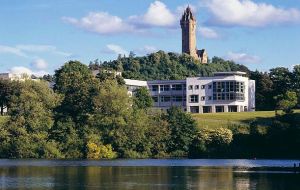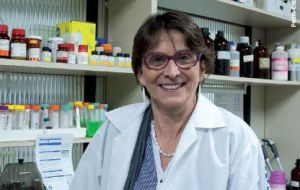MercoPress. South Atlantic News Agency
Rousseff eliminates regulations which impeded public universities working with the private sector
 The law authorizes universities and public research institutions to work more freely with companies, including a mechanism giving access to public research facilities.
The law authorizes universities and public research institutions to work more freely with companies, including a mechanism giving access to public research facilities.  The changes are meant to put Brazil “on a new path to innovation,” says biologist Helena Nader, head of the Brazilian Society for the Progress of Science
The changes are meant to put Brazil “on a new path to innovation,” says biologist Helena Nader, head of the Brazilian Society for the Progress of Science  “A revolutionary technology isn’t worth anything if it just sits on a laboratory shelf,” Rousseff said in announcing the new law in Brasília.
“A revolutionary technology isn’t worth anything if it just sits on a laboratory shelf,” Rousseff said in announcing the new law in Brasília. Full-time professors at public universities in Brazil will now be allowed to carry out research in the private sector—and get paid for it, without having to drop their academic jobs. The change is the result of a new law, signed by President Dilma Rousseff, designed to bring science and industry closer together.
The law authorizes universities and public research institutions to collaborate more freely with companies, including a mechanism for giving companies access to public research facilities. The changes are meant to put Brazil “on a new path to innovation,” says biologist Helena Nader, head of the Brazilian Society for the Progress of Science, who helped draft the legislation.
Ties between academia and industry are common practice in the United States and Europe, “which is why they are so much ahead of us,” Nader says. In Brazil, she says, cultural and regulatory hurdles have in the past thrown up barriers between public and private research that have often left innovations languishing in academia.
“A revolutionary technology isn’t worth anything if it just sits on a laboratory shelf,” Rousseff said in announcing the new law in Brasília.
Gonçalo Pereira, a geneticist at the University of Campinas (Unicamp) here, compares the situation to running on a treadmill: “You burn a lot of calories, but you don’t go anywhere.”
In 2012, regulations required him to relinquish his full-time faculty position at the university after cofounding GranBio, a biotech firm that works on sugarcane genetics and cellulosic ethanol. The new law, Pereira says, will “let Brazilian entrepreneurs out of their cage.”
The law also makes it much easier for researchers to purchase everything from chemical reagents to electron microscopes. Previously, scientists at public institutions had to solicit bids when they needed an item, and go with the lowest bidder, even if that meant purchasing something of lesser quality. Now, they can go directly to a manufacturer. “That’s absolutely crucial,” says Paulo Arruda, a plant geneticist at Unicamp. “Bureaucracy is one of our biggest bottlenecks




Top Comments
Disclaimer & comment rules-

-

Read all comments“Professors” in Uruguay are called lecturers everywhere in the western world.
Jan 18th, 2016 - 11:46 am 0There are more 'Professors' here than students it seems. I am sure there are good ones, I just haven't met him or her yet.
I imagine it is the same in Brazil.
@1 ChrisR
Jan 18th, 2016 - 03:38 pm 0you are right. Same in Brazil....just that there are not enough of them....
Commenting for this story is now closed.
If you have a Facebook account, become a fan and comment on our Facebook Page!